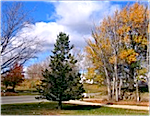Lutheran Religion J

Lutheran Religion J continues our Online Christian Library with the Lutheran orthodoxy section with the links of the Lutheran books by Henry Jacobs.
Lutheran Religion J:
Henry Eyster Jacobs was born in Gettysburg, Pennsylvania, in 1844. Graduating from Lutheran Theological Seminary in 1865, he became a professor at the same school. He later was appointed professor of systematic theology at the Lutheran Theological Seminary of Mount Airy, became its dean and finally its president.
The following is an excerpt from the Preface to his book, Lincoln's Gettysburg World-Message.
|
Gettysburg will live in history because of its association with Lincoln even more than as the scene of the decisive battle of the Civil War. As time passes, the details of battles interest chiefly students of military science. Even veterans grow weary of recalling the horrors of the battlefield, and prefer to glory in the end achieved, rather than in the painful experiences through which they have passed. So vast, too, has been the scale upon which battles have been fought in the Great War that has recently ended, that those of preceding wars have been dwarfed into relative insignificance. But the memory of Gettysburg will survive because of the interpretation given the battle by one who was not only the Commander-in-chief of the armies of the Union which there triumphed, but also the great prophet of the cause of civil and religious liberty. The battle itself was only the prelude to the still mightier force that was transmitted in his telling words, which not only sounded the rallying cry for the final struggle of the war, on which the fate of our nation then hung, but which unintentionally gave the signal for the assertion throughout the world of great principles that had hitherto been suppressed. |















New! Comments
Have your say about what you just read! Leave me a comment in the box below.